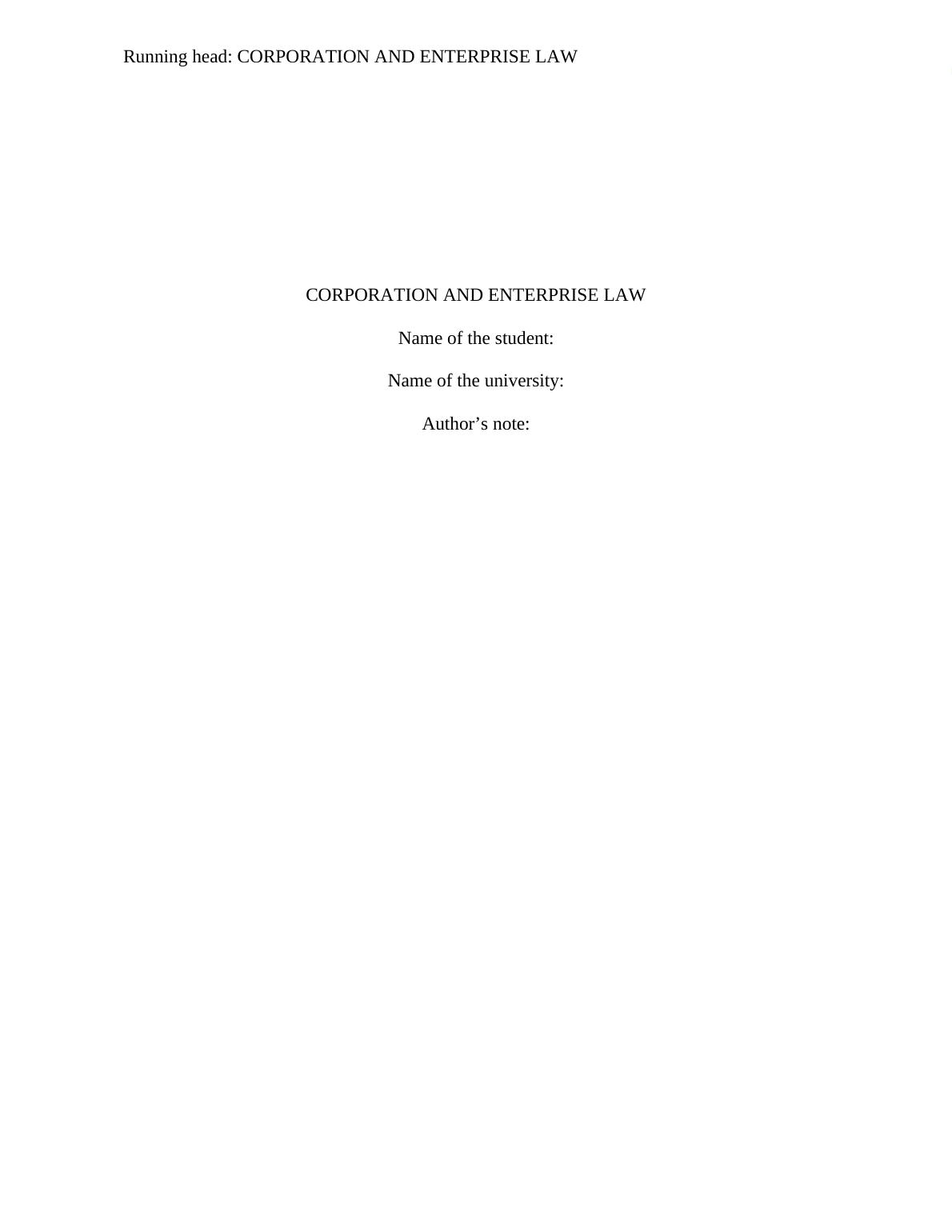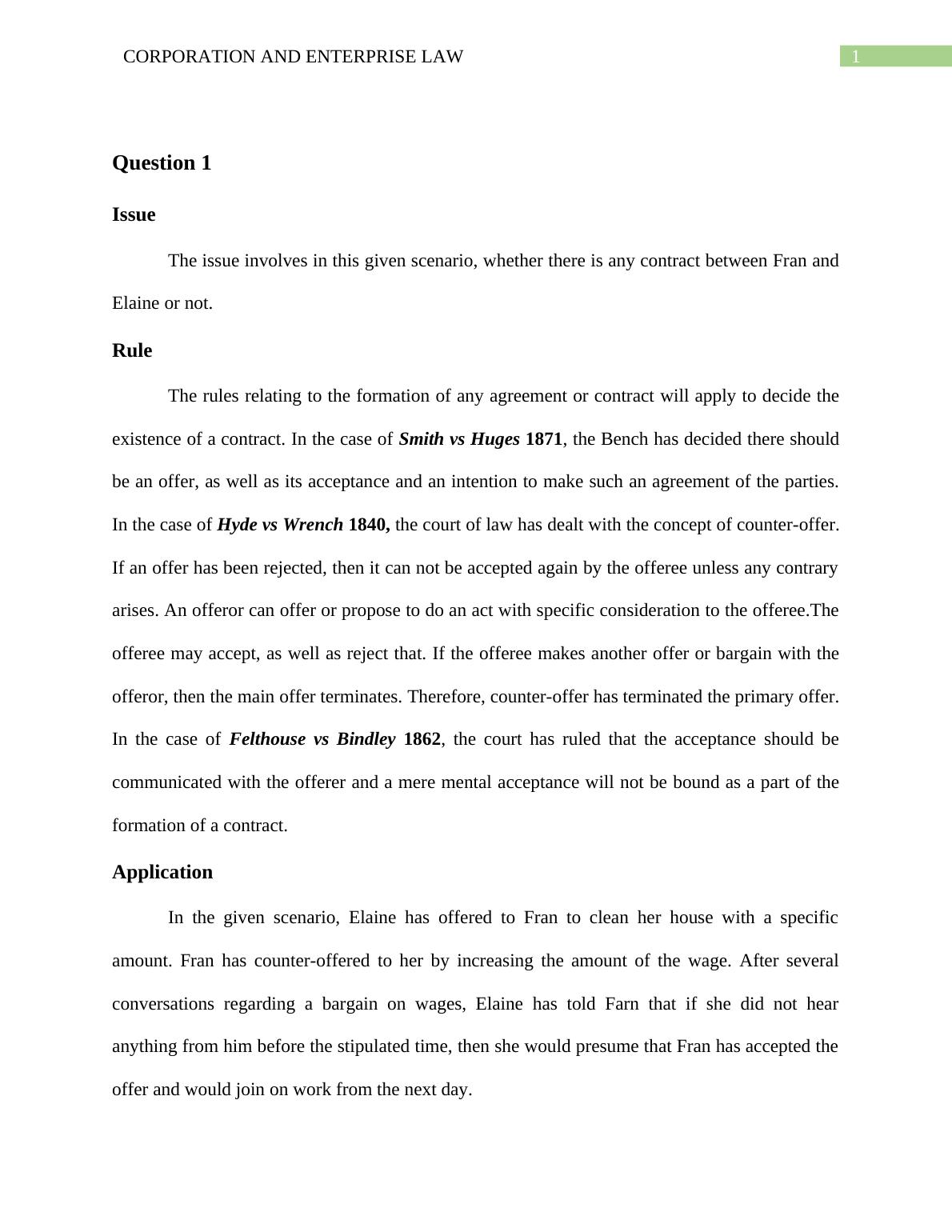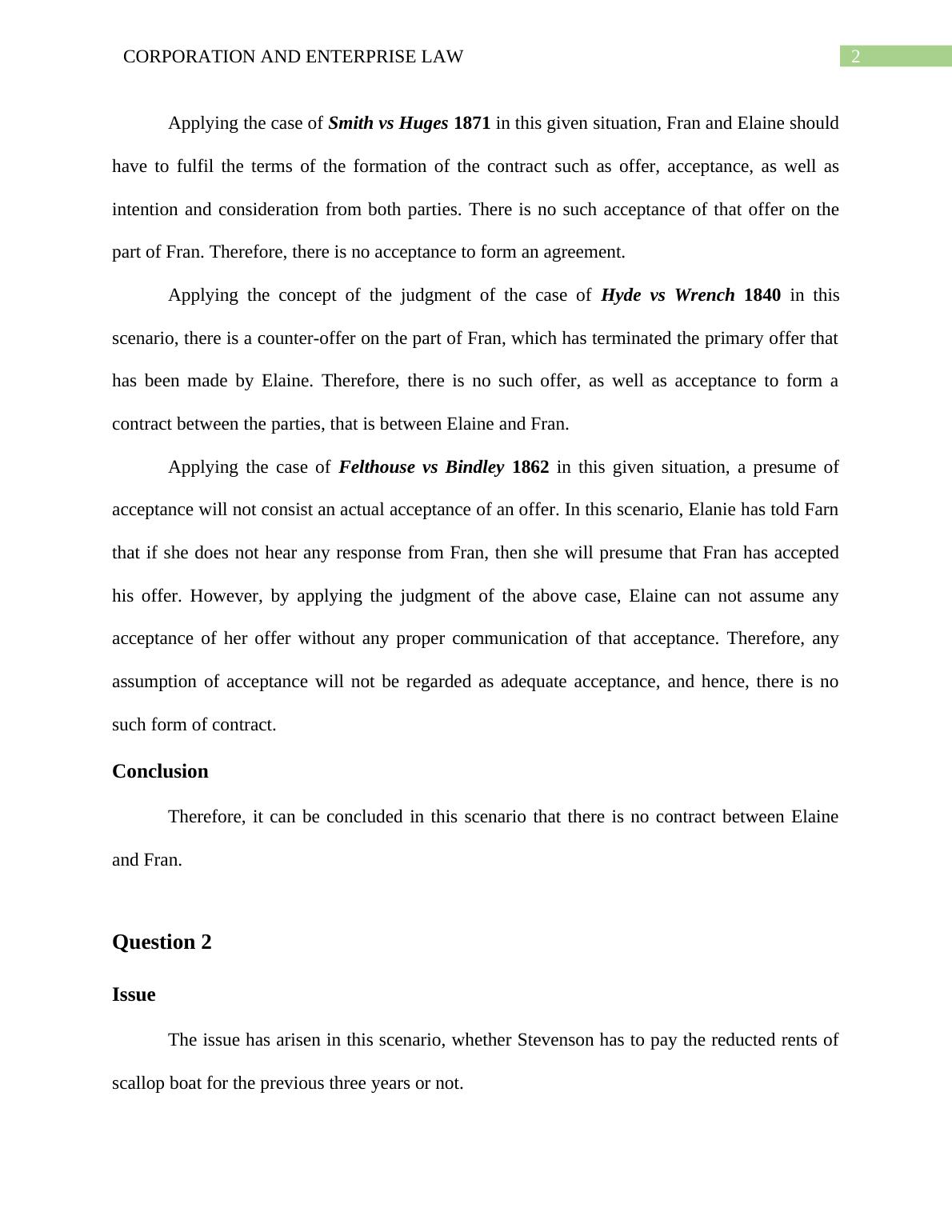Corporation and Enterprise Law | Question and Application
Added on 2022-07-29
6 Pages1224 Words20 Views
0
Running head: CORPORATION AND ENTERPRISE LAW
CORPORATION AND ENTERPRISE LAW
Name of the student:
Name of the university:
Author’s note:
Running head: CORPORATION AND ENTERPRISE LAW
CORPORATION AND ENTERPRISE LAW
Name of the student:
Name of the university:
Author’s note:

CORPORATION AND ENTERPRISE LAW1
Question 1
Issue
The issue involves in this given scenario, whether there is any contract between Fran and
Elaine or not.
Rule
The rules relating to the formation of any agreement or contract will apply to decide the
existence of a contract. In the case of Smith vs Huges 1871, the Bench has decided there should
be an offer, as well as its acceptance and an intention to make such an agreement of the parties.
In the case of Hyde vs Wrench 1840, the court of law has dealt with the concept of counter-offer.
If an offer has been rejected, then it can not be accepted again by the offeree unless any contrary
arises. An offeror can offer or propose to do an act with specific consideration to the offeree.The
offeree may accept, as well as reject that. If the offeree makes another offer or bargain with the
offeror, then the main offer terminates. Therefore, counter-offer has terminated the primary offer.
In the case of Felthouse vs Bindley 1862, the court has ruled that the acceptance should be
communicated with the offerer and a mere mental acceptance will not be bound as a part of the
formation of a contract.
Application
In the given scenario, Elaine has offered to Fran to clean her house with a specific
amount. Fran has counter-offered to her by increasing the amount of the wage. After several
conversations regarding a bargain on wages, Elaine has told Farn that if she did not hear
anything from him before the stipulated time, then she would presume that Fran has accepted the
offer and would join on work from the next day.
Question 1
Issue
The issue involves in this given scenario, whether there is any contract between Fran and
Elaine or not.
Rule
The rules relating to the formation of any agreement or contract will apply to decide the
existence of a contract. In the case of Smith vs Huges 1871, the Bench has decided there should
be an offer, as well as its acceptance and an intention to make such an agreement of the parties.
In the case of Hyde vs Wrench 1840, the court of law has dealt with the concept of counter-offer.
If an offer has been rejected, then it can not be accepted again by the offeree unless any contrary
arises. An offeror can offer or propose to do an act with specific consideration to the offeree.The
offeree may accept, as well as reject that. If the offeree makes another offer or bargain with the
offeror, then the main offer terminates. Therefore, counter-offer has terminated the primary offer.
In the case of Felthouse vs Bindley 1862, the court has ruled that the acceptance should be
communicated with the offerer and a mere mental acceptance will not be bound as a part of the
formation of a contract.
Application
In the given scenario, Elaine has offered to Fran to clean her house with a specific
amount. Fran has counter-offered to her by increasing the amount of the wage. After several
conversations regarding a bargain on wages, Elaine has told Farn that if she did not hear
anything from him before the stipulated time, then she would presume that Fran has accepted the
offer and would join on work from the next day.

CORPORATION AND ENTERPRISE LAW2
Applying the case of Smith vs Huges 1871 in this given situation, Fran and Elaine should
have to fulfil the terms of the formation of the contract such as offer, acceptance, as well as
intention and consideration from both parties. There is no such acceptance of that offer on the
part of Fran. Therefore, there is no acceptance to form an agreement.
Applying the concept of the judgment of the case of Hyde vs Wrench 1840 in this
scenario, there is a counter-offer on the part of Fran, which has terminated the primary offer that
has been made by Elaine. Therefore, there is no such offer, as well as acceptance to form a
contract between the parties, that is between Elaine and Fran.
Applying the case of Felthouse vs Bindley 1862 in this given situation, a presume of
acceptance will not consist an actual acceptance of an offer. In this scenario, Elanie has told Farn
that if she does not hear any response from Fran, then she will presume that Fran has accepted
his offer. However, by applying the judgment of the above case, Elaine can not assume any
acceptance of her offer without any proper communication of that acceptance. Therefore, any
assumption of acceptance will not be regarded as adequate acceptance, and hence, there is no
such form of contract.
Conclusion
Therefore, it can be concluded in this scenario that there is no contract between Elaine
and Fran.
Question 2
Issue
The issue has arisen in this scenario, whether Stevenson has to pay the reducted rents of
scallop boat for the previous three years or not.
Applying the case of Smith vs Huges 1871 in this given situation, Fran and Elaine should
have to fulfil the terms of the formation of the contract such as offer, acceptance, as well as
intention and consideration from both parties. There is no such acceptance of that offer on the
part of Fran. Therefore, there is no acceptance to form an agreement.
Applying the concept of the judgment of the case of Hyde vs Wrench 1840 in this
scenario, there is a counter-offer on the part of Fran, which has terminated the primary offer that
has been made by Elaine. Therefore, there is no such offer, as well as acceptance to form a
contract between the parties, that is between Elaine and Fran.
Applying the case of Felthouse vs Bindley 1862 in this given situation, a presume of
acceptance will not consist an actual acceptance of an offer. In this scenario, Elanie has told Farn
that if she does not hear any response from Fran, then she will presume that Fran has accepted
his offer. However, by applying the judgment of the above case, Elaine can not assume any
acceptance of her offer without any proper communication of that acceptance. Therefore, any
assumption of acceptance will not be regarded as adequate acceptance, and hence, there is no
such form of contract.
Conclusion
Therefore, it can be concluded in this scenario that there is no contract between Elaine
and Fran.
Question 2
Issue
The issue has arisen in this scenario, whether Stevenson has to pay the reducted rents of
scallop boat for the previous three years or not.

End of preview
Want to access all the pages? Upload your documents or become a member.
Related Documents
Consensus ad idem: The Meeting of the Mindslg...
|5
|1670
|349
Enterprise Law Of Agreementslg...
|8
|1791
|55
Contract Law: Formation, Invitation to Treat, Acceptance and Alternative Dispute Resolutionlg...
|9
|2603
|410
Contract and Corporations Law Issues 2022lg...
|10
|2448
|12
Legal Advice on Refusal to Take Wheatlg...
|5
|1347
|31
Contractual Relationship and Consumer Rightslg...
|8
|2046
|91
